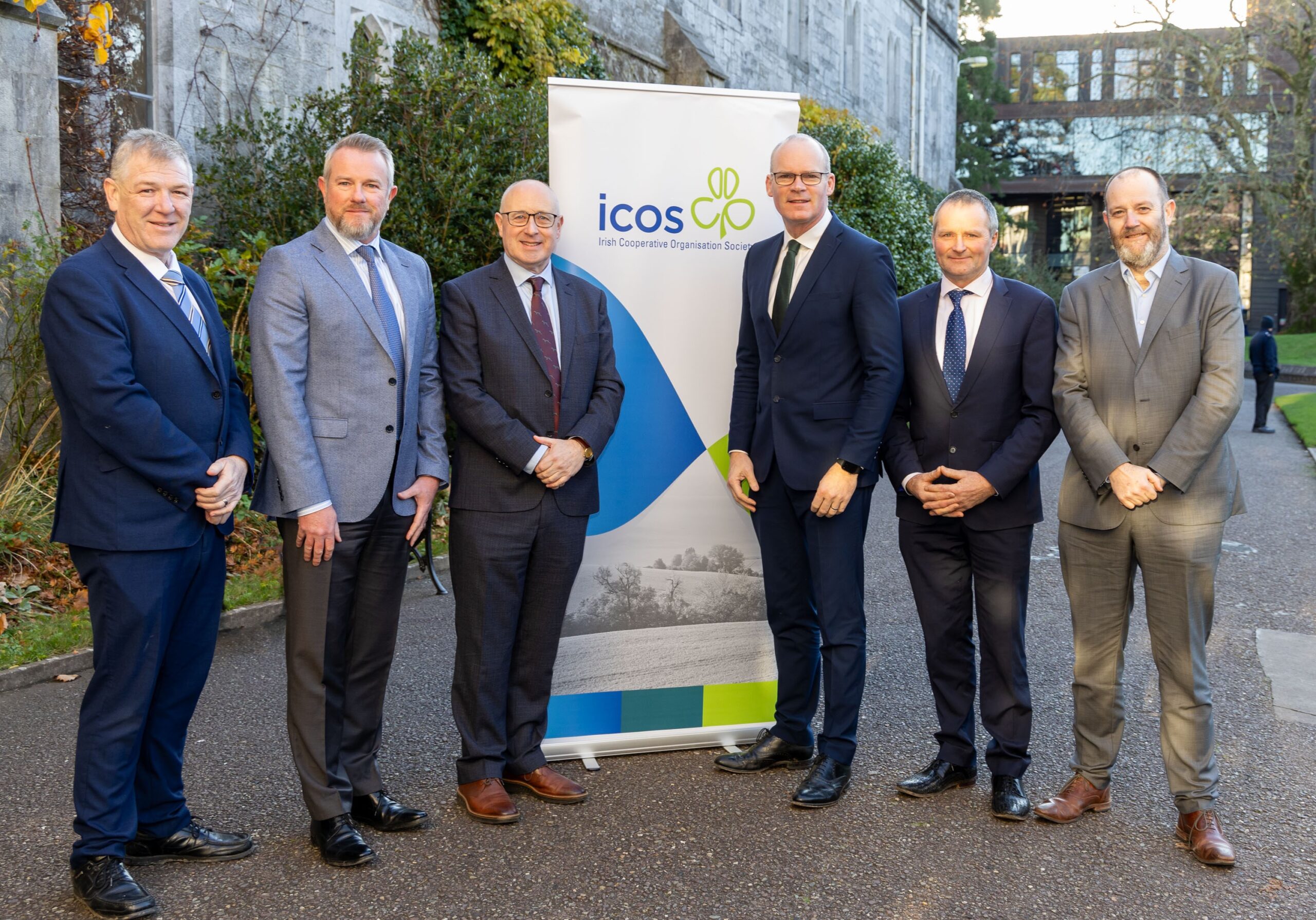ICOS/UCC Conference
 PIC 4 L-R: Billy Goodburn, ICOS Skillnet Head of Learning & Development; Mark Jordan, Chief Strategy Officer, Skillnet Ireland; Professor Paul McSweeney, Vice-President for Learning and Teaching UCC; Simon Coveney TD, Minister for Enterprise, Trade & Employment; ICOS President Edward Carr, TJ Flanagan, CEO, ICOS, at the ICOS/UCC Conference Developing a Sustainable Dairy Future 4th & 5th December 2023. Picture by Alf Harvey.
PIC 4 L-R: Billy Goodburn, ICOS Skillnet Head of Learning & Development; Mark Jordan, Chief Strategy Officer, Skillnet Ireland; Professor Paul McSweeney, Vice-President for Learning and Teaching UCC; Simon Coveney TD, Minister for Enterprise, Trade & Employment; ICOS President Edward Carr, TJ Flanagan, CEO, ICOS, at the ICOS/UCC Conference Developing a Sustainable Dairy Future 4th & 5th December 2023. Picture by Alf Harvey.
How can Irish farmers and dairy co-operatives turn challenge into opportunity? – Dairy industry leaders, experts, and stakeholders gathered at University College Cork (UCC) for an essential two-day conference, titled The Sustainability Event on 4th and 5th December, discussing a sustainable, profitable path for Ireland’s dairy industry amid pressing environmental, economic, and regulatory challenges.
The Aula Maxima (Great Hall) in UCC was the venue for the successful conference focussing on the challenges and opportunities for Irish dairy farmers and co-operatives. The event was opened by Enterprise, Trade and Employment Minister Simon Coveney TD. The conference was jointly organised by the Irish Co-operative Organisation Society (ICOS), University College Cork (UCC Food Industry Training Unit), ICOS Skillnet and The Plunkett Institute and takes place in the Aula Maxima (Great Hall) at UCC.

ICOS President Edward Carr said:
“We gather at a time when Irish agriculture is facing very significant economic and environmental challenges. The opportunity for the co-operative movement is to show positivity, leadership and direction, so that there is a sustainable and profitable pathway for our members within the dairy industry, from the primary food producer to the co-operative processors who contribute to dairy exports of €6.8 billion annually and a total of €17 billion in value to the rural communities of the country.”
“These challenges are coming at a time when we’re trying to encourage young people to get involved in the dairy industry. Generational renewal is a common issue all over Europe, and it is on a par with sustainability as a priority. Genuine questions are now being asked, as to where is the next generation of food producers going to come from. Gender equality is also high on the agenda of the co-operative movement. In the past year we have seen some welcome developments with the adoption of the ICOS Gender Equality Charter and already we are seeing the fruits of this initiative at co-op level.”
“As a consequence of the reduction in the maximum stocking rate, huge question marks hang over the future of the next generation of dairy farmers.
“I attended the recent meeting in Dublin with the European Commissioner. His decision not to provide even a small degree of flexibility is bitterly disappointing. It is very unfortunate that the Commission are unwilling to give the range of new measures – designed to improve water quality under Ireland’s current derogation – the time to be implemented, and their impact on water quality assessed.
“Farmers affected by this decision are deeply frustrated, and rightly so. The message from the Commissioner is that water quality needs to stabilise and improve. If this can happen, the derogation can be protected in the medium to long term. I believe there are some grounds for optimism. The latest EPA reporting on water quality does demonstrate stability, and water quality is improving in the Priority Areas for Action where the ASSAP programme is active. The aim of improving soil fertility and reducing chemical fertiliser has been to the fore for all farmers in recent years.
“While farmers have made huge investments at farm level to improve the management of slurry, we need to continue to make these improvements, despite the uncertainty over the future of the derogation. The return from these investments will provide farmers with the options to make better use of their nutrients and also ensure that these nutrients are applied at the most appropriate time. However, farmers are fearful of investing in new slurry storage capacity, in case of a further reduction to the derogation. The Government and EU must provide certainty to allow farmers to continue to invest and improve their farm facilities.
“Important progress has been made by the dairy and wider agriculture sector in reducing greenhouse gas emissions. I personally don’t know any farmer that has not adopted environmentally friendly practices on their farm in recent years. I strongly believe that the environment is in the DNA of the Irish family farm. My message is that the dairy sector is taking its responsibilities seriously and is delivering. There is no other economic sector as engaged and focused on the environment. My message to the Government, is that they must provide the resources and time to allow for adoption of sustainability measures at farm level.”
–Ends–